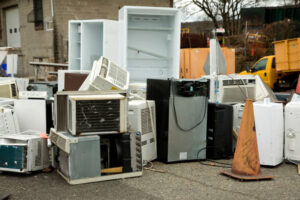Rwanda, the United Nations Environment Programme (UNEP), the University of Birmingham, and other project partners will share £4 million in order to eliminate dangerous emissions from aged air conditioning, refrigeration, and cold supply networks.
The environmentally beneficial funding was revealed on April 20, with the goal of preserving the ozone layer, which protects the world from UV radiation.
Funding will be awarded in May of this year as part of Defra’s Sustainable Cooling and Cold Chain Solutions programme.
Thérèse Coffey, the United Kingdom’s secretary of state for the environment, stated, “This funding will help developing countries play their part in tackling climate change and communities around the world with more efficient food and medicine storage – as well as support farmers to increase their productivity.”
The investment will also help to improve the management of the refrigerated chain for fruits and vegetables.
Read also: Nigeria, UNIDO, GEF Partner To Meet Clean Energy, Climate Action SDGs
How Poor Cold-Chain Management Is Affecting Food Production
Small-holder farmers produce 80 percent of the food produced in Sub-Saharan Africa; around 37 percent of all food is wasted between production and consumption, and nearly 50 percent of fruits and vegetables are lost owing to poor cold-chain management.
Currently, in developing economies, a lack of adequate cold storage and refrigerated transport vehicles contributes to over 1.5 million vaccine-preventable deaths per year.
According to estimates, 25% of vaccinations arrive at their destination with impaired efficacy, owing mostly to breaks in cold chains.
Officials from Rwanda’s Ministry of Environment confirmed the country’s commitment to establishing the Africa Centre of Excellence for Sustainable Cooling and Cold-chain (ACES) headquarters in Kigali, which is set to open in late 2023.
Cold Economy Professor at the University of Birmingham and Heriot-Watt University, Professor Toby Peters, is leading the collaboration of UK universities supporting this project in Africa and India.
“Sustainable and equitable cooling and cold-chain infrastructure is now more critical than ever in a warming world,” he said. Food preservation is just as vital as food production.
For the first time, this plan provides an integrated approach that includes on-the-ground training and support for subsistence farmers and their communities, viable business models, and a network of qualified engineers to assist with equipment installation and maintenance.”
Professor Peters explained that doing so will allow ACES to address multiple global challenges at the same time, including “mitigating climate change and the environmental impacts of meeting new cooling demand; reducing food loss and converting it into increased farmer incomes, food security, and consumer affordability; and designing the next generation of efficient, resilient, responsive, and sustainable vaccine cold-chains.”
In addition to financing pledges from the United Kingdom, the Rwandan government is overseeing the building of critical campus infrastructure to support the Centre.
The University of Birmingham, Heriot-Watt University, Cranfield University, and London South Bank University are leading a consortium of Rwandan and UK universities in developing the Centre’s teaching and research programmes, which will provide a pipeline of skills, expertise, and innovation in cooling technology solutions, systems, and models.
The UK’s ACES funding is assisting in the construction of Specialised Outreach and information Establishments (SPOKEs) to transfer information and implement solutions across Africa, with the first of these being established in Kenya, as well as giving technical help to duplicate the model in Telangana and Haryana, India.
Defra has allocated an additional £1.2 million to project partners to support the development of roadmaps and digital tools to help developing countries design equitable, resilient, and cost-effective approaches, quantify the full economic, environmental, and societal impact, and understand the policy landscape required to implement new approaches.
Rwanda’s Plans For Ozone-Safe Electronic Appliances
Rwanda is contemplating a new mechanism to facilitate access to inexpensive, ozone-safe refrigerators and air conditioners that do not contribute to climate change.
According to information provided by the Rwanda Environment Management Authority, there is a programme called ” A green on-wage financing mechanism ” that aims to make energy-efficient and climate-friendly refrigerators and air conditioners more affordable.
The programme is part of the Rwanda Cooling Finance Initiative (R-COOL FI), which aims to promote energy-efficient and climate-friendly cooling and the recycling of inefficient existing systems.
By 2024, the initiative hopes to generate $4 million in financing to support the procurement of 12,500 climate-friendly and energy-efficient cooling products in Rwanda.
She stated that energy-efficient and eco-friendly refrigerators and air conditioners are available at a discount through credit.
As part of implementing the Montreal Protocols, Rwanda reduced by 54% by the year 2020 its importation of ozone-depleting hydro-chlorofluorocarbons (HCFCs).




